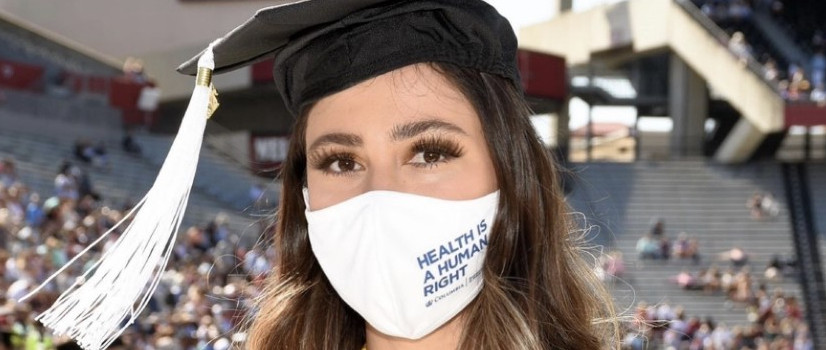Raphaela O’Connor didn’t want to get in the water.
Her family was swimming in Lake Tahoe and they were calling for her to jump in and take a dip with them.
O’Connor, then 9 years old, wouldn’t budge. She’d done the research — she knew that the lake could be contaminated with Naegleria fowleri, a brain-eating amoeba that thrives in warm freshwater lakes. She knew that the bacterium swims up the olfactory nerve and into the brain, where it feasts on tissue. She knew that people infected by the bacteria usually don’t survive.
Her knowledge wasn’t a byproduct of fear, but fascination.
“I used to watch Monsters Inside Me and read all this research about amoebas and mad cow disease and other diseases,” says O’Connor, a 2021 global studies graduate. “You get too deep at first because you’re researching all these things, but I think it’s fun, at the end of the day, to do all this research about different diseases.”
O’Connor has always been attuned to how her environment affects her health. She had to be. She spent much of her childhood in and out of emergency rooms because of severe allergic asthma. When she was in high school, she was diagnosed with Alpha-1 antitrypsin deficiency, an inherited disease that leaves the lungs vulnerable to irritants and infections. At the same time, she started volunteering with Project Cool Breeze, a project helmed by South Carolina State Rep. Wendell Gilliard that distributes air conditioning units to older adults to ensure they’re breathing cool, clean air during hot South Carolina summers.
All that time in hospitals, doing volunteer work and reading about diseases instilled in O’Connor a deep passion for public health — which led her to Columbia University’s Mailman School of Public Health. She’ll study the impact of environmental exposures and climate change on human health.
But despite her lifelong interest in it, O’Connor didn’t always have her sights set on pursuing public health. O’Connor came to South Carolina though its Gamecock Gateway program, a one-year, invitation-only bridge program designed to help students transfer into the university. It meant she’d live on campus but take classes at Midlands Technical College.
“It’s basically your year to prove that, by your sophomore year, you can be at South Carolina fully,” O’Connor says.
She’d been accepted to other universities who didn’t invite her to complete a bridge program, and so the Charleston native thought she might leave the state for college. But she didn’t feel as welcomed at any other school as she did at South Carolina, so she used the invitation to the Gamecock Gateway program as motivation.
“I wanted to prove that I could be at UofSC,” O’Connor says. “And it turned out to be amazing. I felt really included, and I felt like it was a really easy transition.”
O’Connor entered the political science program; she thought she might want to be a diplomat or an ambassador. But learning about American politics just wasn’t clicking. She wanted a more flexible program that could help her learn about the rest of the world.
“When I switched to global studies,” she says, “it was like, ‘Wow, I finally feel like I’m at a place where I can take everything.’”
She took religion and anthropology courses to study Islam and learn more about the Middle East. She studied French. She took an introductory-level geography course that she thought was going to be a snooze, but the class used geographic information systems to map public health issues and disease outbreaks. She loved the class so much that she started tracking and mapping health issues in her free time.
Global studies really helped me figure out what I wanted to do. I took a lot of random classes — but it wasn’t random. It all pieced together. It all turned into this one worldview picture.
— Raphaela O’Connor
Jessica Barnes, assistant professor of geography and assistant director of the global studies major, taught two classes that had a profound effect on O’Connor: Geography of the Middle East and International Development and the Environment. Barnes says that O’Connor always engaged in class, if maybe a bit shy. And she could see the how the global studies program was broadening O’Connor’s horizons.
“I think it opened her eyes to a part of the world she’s really interested in and whetted her appetite,” Barnes says.
The global studies program’s interdisciplinary nature also helped O’Connor think about public health beyond the hard sciences.
“The global studies program has a humanitarian point of view,” O’Connor says. “Usually, when people think about public health, they think about biostatistics or different sciences or math. But I think there’s more to be said about having that humanitarian aspect.”
When O’Connor was ready to apply for graduate school, she turned to Barnes for help with her application and personal statement. When Barnes read O’Connor’s first draft, she was impressed with O’Connor’s story and her volunteer experience. Barnes had no idea about O’Connor’s experiences with the lung disease Alpha-1, for example, or her work with Project Cool Breeze.
With Barnes’s assistance and encouragement, O’Connor applied to several top-ranked public health graduate programs — and got into all of them. She chose Columbia University because of the Mailman School’s interdisciplinary, humanitarian approach.
Now, three years after making it through the Gamecock Gateway program — and more than a decade after she stayed dry at Lake Tahoe — O’Connor is ready to dive into the larger world. The global studies program was her springboard.
“I finally felt validated,” O’Connor says. “Now, I feel like I can get a public health job anywhere.”
This story was part of the College of Arts and Sciences Fall 2021 alumni magazine. To read more stories from this magazine, visit go.sc.edu/CASMagazine.
